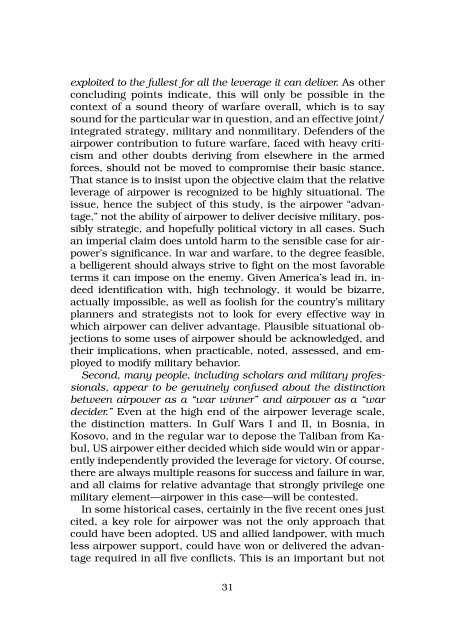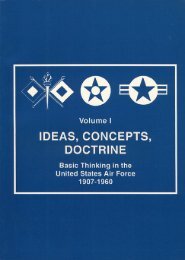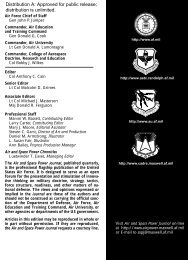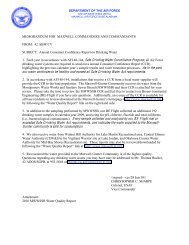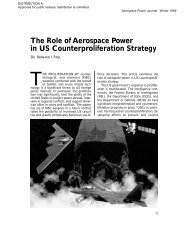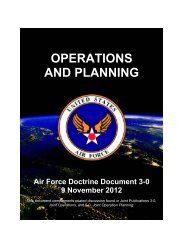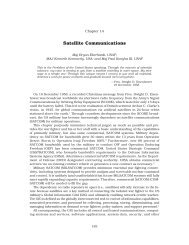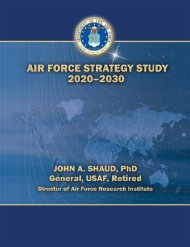The Airpower Advantage in Future Warfare
the Airpower Advantage in future Warfare - Air University Press
the Airpower Advantage in future Warfare - Air University Press
You also want an ePaper? Increase the reach of your titles
YUMPU automatically turns print PDFs into web optimized ePapers that Google loves.
exploited to the fullest for all the leverage it can deliver. As other<br />
conclud<strong>in</strong>g po<strong>in</strong>ts <strong>in</strong>dicate, this will only be possible <strong>in</strong> the<br />
context of a sound theory of warfare overall, which is to say<br />
sound for the particular war <strong>in</strong> question, and an effective jo<strong>in</strong>t/<br />
<strong>in</strong>tegrated strategy, military and nonmilitary. Defenders of the<br />
airpower contribution to future warfare, faced with heavy criticism<br />
and other doubts deriv<strong>in</strong>g from elsewhere <strong>in</strong> the armed<br />
forces, should not be moved to compromise their basic stance.<br />
That stance is to <strong>in</strong>sist upon the objective claim that the relative<br />
leverage of airpower is recognized to be highly situational. <strong>The</strong><br />
issue, hence the subject of this study, is the airpower “advantage,”<br />
not the ability of airpower to deliver decisive military, possibly<br />
strategic, and hopefully political victory <strong>in</strong> all cases. Such<br />
an imperial claim does untold harm to the sensible case for airpower’s<br />
significance. In war and warfare, to the degree feasible,<br />
a belligerent should always strive to fight on the most favorable<br />
terms it can impose on the enemy. Given America’s lead <strong>in</strong>, <strong>in</strong>deed<br />
identification with, high technology, it would be bizarre,<br />
actually impossible, as well as foolish for the country’s military<br />
planners and strategists not to look for every effective way <strong>in</strong><br />
which airpower can deliver advantage. Plausible situational objections<br />
to some uses of airpower should be acknowledged, and<br />
their implications, when practicable, noted, assessed, and employed<br />
to modify military behavior.<br />
Second, many people, <strong>in</strong>clud<strong>in</strong>g scholars and military professionals,<br />
appear to be genu<strong>in</strong>ely confused about the dist<strong>in</strong>ction<br />
between airpower as a “war w<strong>in</strong>ner” and airpower as a “war<br />
decider.” Even at the high end of the airpower leverage scale,<br />
the dist<strong>in</strong>ction matters. In Gulf Wars I and II, <strong>in</strong> Bosnia, <strong>in</strong><br />
Kosovo, and <strong>in</strong> the regular war to depose the Taliban from Kabul,<br />
US airpower either decided which side would w<strong>in</strong> or apparently<br />
<strong>in</strong>dependently provided the leverage for victory. Of course,<br />
there are always multiple reasons for success and failure <strong>in</strong> war,<br />
and all claims for relative advantage that strongly privilege one<br />
military element—airpower <strong>in</strong> this case—will be contested.<br />
In some historical cases, certa<strong>in</strong>ly <strong>in</strong> the five recent ones just<br />
cited, a key role for airpower was not the only approach that<br />
could have been adopted. US and allied landpower, with much<br />
less airpower support, could have won or delivered the advantage<br />
required <strong>in</strong> all five conflicts. This is an important but not<br />
31


